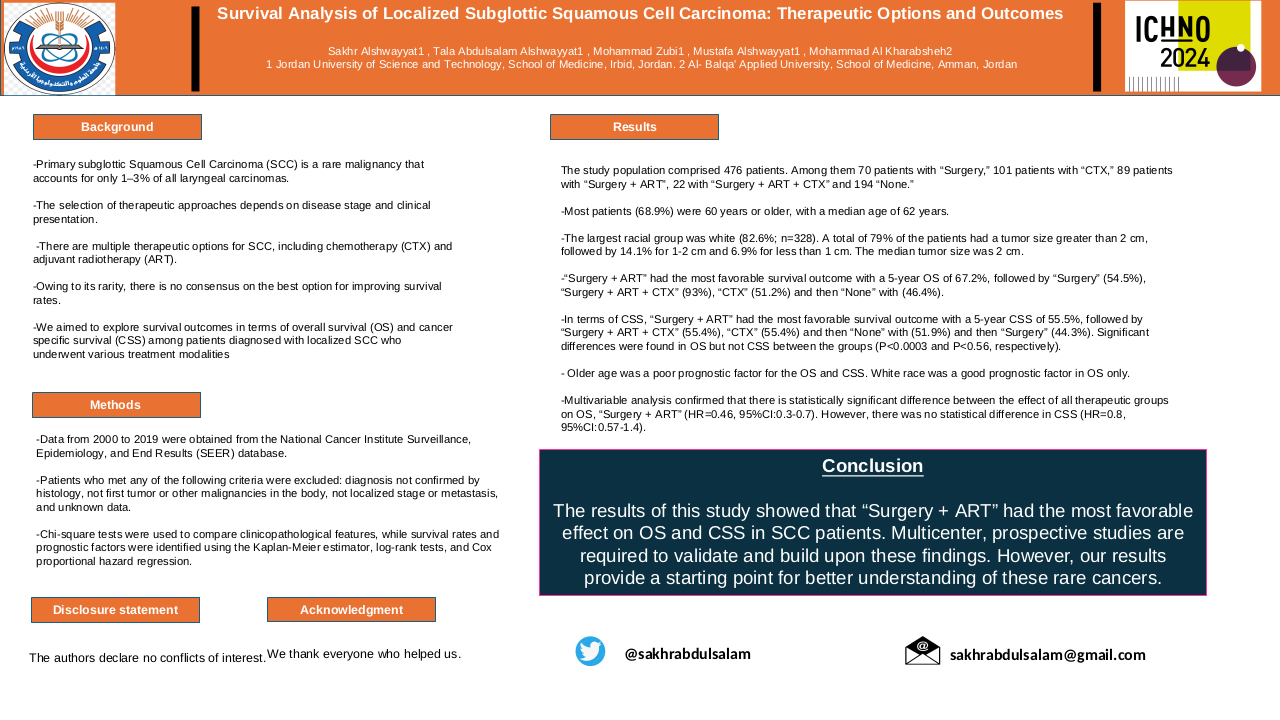Evaluating predictive factors for chemoradiotherapy related dysphagia in patients with head and neck cancer.
Purpose/Objective
The treatment of head and neck cancers has progressed over the years which yields a better chance of long-term survival. Nevertheless, treatment intensification also increases rates of treatment related toxicities. Dysphagia is an underestimated, yet challenging, complain of head and neck cancer patients undergoing chemoradiotherapy. This retrospective study aims to determine if there are any variables that can be used as predictive factors for this outcome.
Material/Methods
All patients diagnosed with head and neck cancer that underwent treatment with definitive chemoradiotherapy with cisplatin every 3 weeks at our center, between 2018 and 2022, were included. Patients that had dysphagia prior to treatment, who died before the end of treatment and patients that lost follow-up within 6 months after treatment end, were excluded. Considering the latter, we collected a sample of 42 individuals from which we obtained data concerning gender, age (< 65 years old vs. ≥ 65 years old), smoking history, HPV status, cancer type (oropharyngeal vs non-oropharyngeal), treatment radiation dose (< 70Gy vs ≥ 70Gy), number of cisplatin cycles and early and late dysphagia outcomes using the CTCAE scale. To evaluate the association between any of these categorical variables and early/late dysphagia outcomes, we applied Fisher's exact test, given the small counts, using the EasyR® software.
Results
Most of our sample included male patients (N = 37; 88,1%) and heavy smokers (N = 34; 80% with > 10 units pack year); with a mean age of 62 years at the time of diagnosis. The most frequent type of cancer was oropharyngeal (N = 21; 50%) followed by laryngeal cancer (N = 12; 28,6%). For early dysphagia, HPV status (p = 0,0357) was significantly associated with outcome, whereas in later dysphagia treatment radiation dose (p = 0,0291) was significantly associated with outcome.
Conclusion
As far as we know, the association between HPV and treatment related dysphagia has not been established. Our results indicate that HPV status has an influence in the patient's risk of developing early dysphagia while treatment radiation dose influences the risk of developing late dysphagia.
- Ray, X., Sumner, W., Sutton, L. et al. Evaluating predictive factors for toxicities experienced by head & neck cancer patients undergoing radiotherapy. J Transl Med 19, 380 (2021). https://doi.org/10.1186/s12967-021-03047-2 - Tengku S, Lohi I, Connelly A, Slaven E, Sloane K, Herity K, McBlain L, Douglas CM, Montgomery J. Late-onset swallowing outcomes post-treatment for head and neck cancer in a UK-based population. J Laryngol Otol. 2023 Mar;137(3):293-300. doi: 10.1017/S0022215122000834. Epub 2022 Mar 23. PMID: 35317872; PMCID: PMC9975761.- Vidyasagar N, Manur Gururajachar J. Predicting toxicity for head and neck cancer patients undergoing radiation therapy: an independent and external validation of MDASI-HN based nomogram. Rep Pract Oncol Radiother. 2020 May-Jun;25(3):355-359. doi: 10.1016/j.rpor.2020.03.005. Epub 2020 Mar 19. PMID: 32256219; PMCID: PMC7103655. - Denaro N, Merlano MC, Russi EG. Dysphagia in Head and Neck Cancer Patients: Pretreatment Evaluation, Predictive Factors, and Assessment during Radio-Chemotherapy, Recommendations. Clin Exp Otorhinolaryngol. 2013 Sep;6(3):117-26. doi: 10.3342/ceo.2013.6.3.117. Epub 2013 Sep 4. PMID: 24069513; PMCID: PMC3781223.






